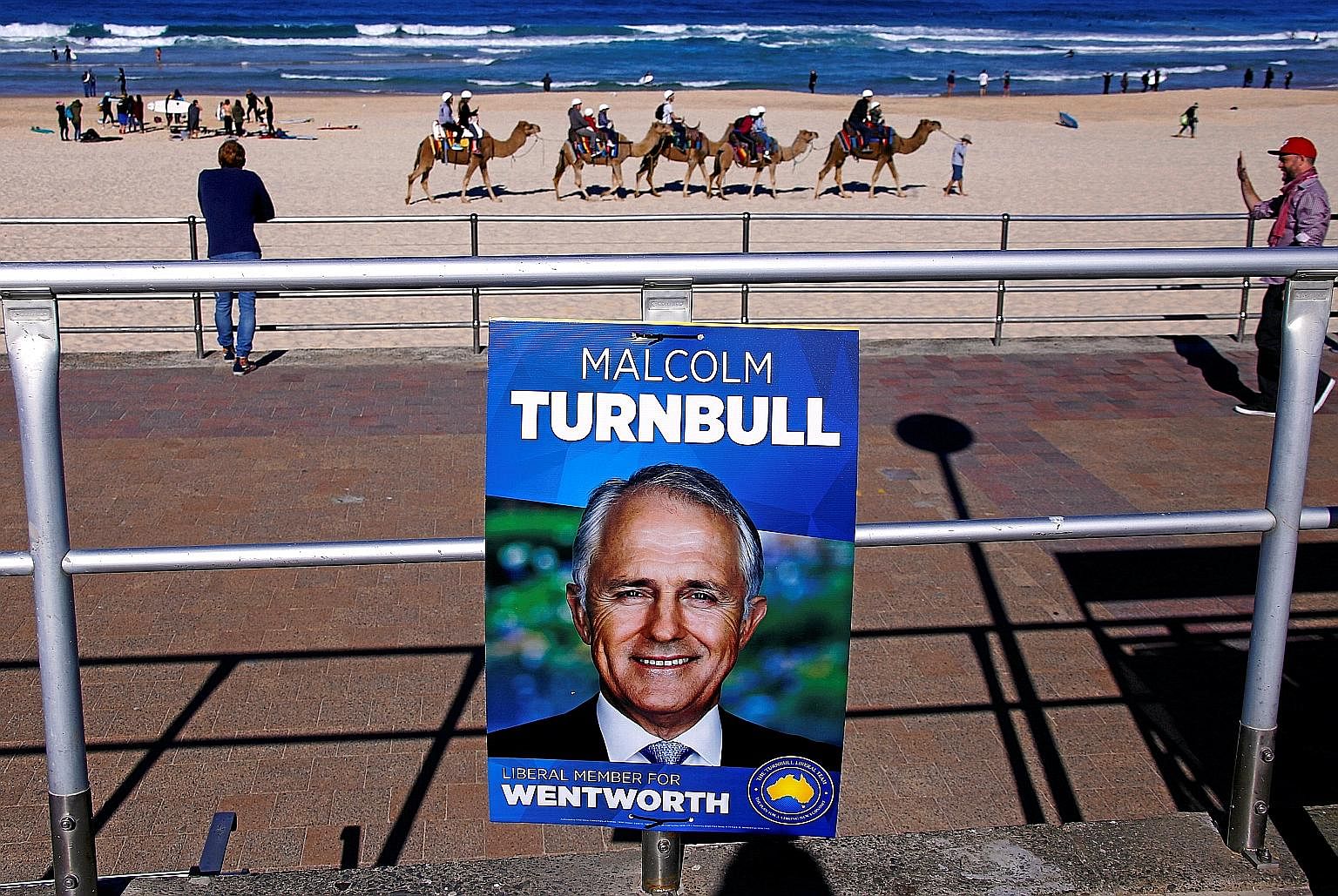Australia's embattled Prime Minister Malcolm Turnbull yesterday faced open recriminations within his party and calls by the opposition to resign following a dismal election result which could leave the nation with a hung Parliament.
Despite presiding over a stable economy with low unemployment, Mr Turnbull's ruling Liberal-National Coalition was deserted by voters in last Saturday's election. It suffered a swing of about 3.7 per cent and will struggle to win a majority in the 150-member Lower House, with counting to resume today.
Mr Turnbull did not speak publicly yesterday but has insisted that he remains "quietly confident" of forming a majority.
In contrast, the leader of the opposition Labor Party, Mr Bill Shorten, appeared triumphant as he urged Mr Turnbull to resign.
Mr Shorten, a former union leader, said Mr Turnbull had pledged to provide stability if re-elected. But the Prime Minister's gamble to call an early election had instead left the nation with an uncertain future and an unruly Upper House of Parliament, including up to four members of Ms Pauline Hanson's far-right, anti-Muslim One Nation party.
Critics also point out that Mr Turnbull's ploy to use the election to try to clear out minor parties from the Senate had backfired. The election looks set to deliver more seats to minor parties and independents, meaning it could be even harder to pass legislation through the Senate.

"Mr Turnbull clearly doesn't know what he is doing," said Mr Shorten yesterday.
"He has taken this nation to an election on the basis of stability. He has delivered instability. His own party knows he is not up to the job, the Australian people know he is out of touch… Frankly, I think he should quit."
Launching a stinging rebuke, Mr Shorten likened Mr Turnbull's position to that of British Prime Minister David Cameron, who called a referendum on Britain's membership in the European Union - which he effectively lost - and subsequently announced his resignation.
"This guy is like David Cameron of the southern hemisphere," Mr Shorten said.
"He leads a divided party, he has had an election and he has delivered an inferior and unstable outcome."
Since deposing Mr Tony Abbott last September, Mr Turnbull, a former investment banker, has gone from saviour of the ruling Coalition to a weakened leader who is fighting to form a government - and may soon be fighting to keep his job as Coalition leader.
Some of Mr Turnbull's own MPs have turned against him.
A Queensland MP, Ms Michelle Landry, who appears likely to lose her seat, yesterday said the Coalition lost voters after switching from Mr Abbott.
Mr Cory Bernardi, an outspoken conservative and long-term critic of Mr Turnbull, said the Prime Minister should consider "if he did the Liberal Party a service or a disservice".
"People should examine their conscience, think about their contribution to this disaster," he told 5AA Radio. "I would prevail upon them to do the right thing."
But there were also MPs who leapt to Mr Turnbull's defence, blaming party officials for the poor campaign and insisting that Mr Abbott - a divisive and unpopular figure - would have fared much worse.
"Whatever criticisms there may be of the campaign they don't lie at the Prime Minister's door," said the Attorney-General, Mr George Brandis.
Commentators have criticised Mr Turnbull's campaign, which appeared to lack energy and relied on a somewhat vague mantra of "jobs and growth".
His campaign centred on a A$50 billion (S$50 billion) long-term plan to cut corporate taxes - a measure supported by many economists but which forced Mr Turnbull to continuously talk about companies rather than people.
In contrast, Mr Shorten pledged extra spending on health and education, and attempted to focus on the daily concerns of voters.
An expert on Australian politics, Dr Nick Economou of Monash University, said Mr Turnbull had failed to set a clear economic plan that connected with voters in marginal seats. This had allowed Labor to launch a fear campaign that painted the Coalition as a threat to public health and education.
"Even if he does secure a majority, Turnbull has been damaged - probably irreparably - by this election," he wrote in The Australian Financial Review.
